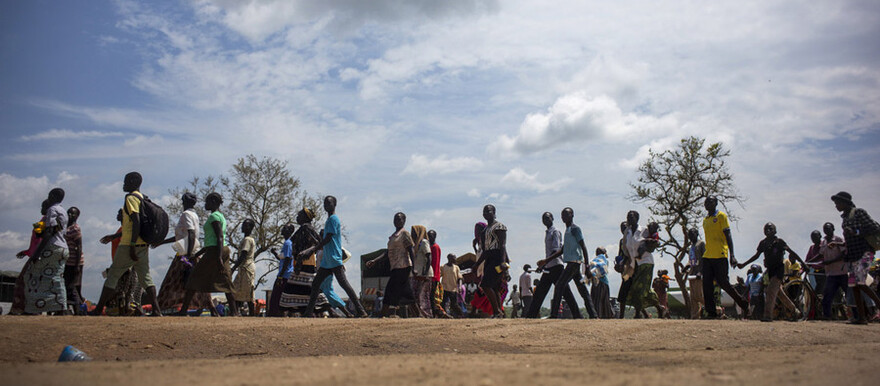Twenty-five years ago, on the banks of the remote Bala Murghab River, I witnessed and supported a community of 8,000 Afghan Turcomen who sought and accessed safety from violence.
Villages in northern Afghanistan were falling in rapid succession to a relentless Taleban surge, and the tightknit community of Marechak forded the river and ensured their safety. The Murghab River was not just a natural barrier, but an international boundary between Afghanistan and Turkmenistan. When the Marechaki families crossed it, they exercised their right to seek and enjoy asylum, and they triggered the international obligation of their new host state to not repulse them, and to grant them safety.
If war is a failure of our international rules-based system, asylum is a small victory — a safety net which recognizes that innocents should have the means to escape horrors and to receive protection. Thus, the right to seek safety is a right that you exercise when your other rights are violated. It is realistic, rather than idealistic. It saves lives and it provides respite — every day, and for millions.
Today, some 100 million people around the world are forcibly displaced by conflict and persecution. Twenty-seven million of them are refugees. They are the shards of our fractured international order.
On this day of 20 June, the United Nations marks World Refugee Day, when we commemorate the strength and resilience of people forced to flee. We reaffirm that seeking asylum is a human right. Anyone fleeing persecution, conflict, or human rights abuses has a right to seek protection in another country. UNHCR, the UN Refugee Agency, is restating five core principles that have saved these and countless other lives: the right to seek asylum; safe access; no pushbacks; no discrimination; and humane treatment.
Granting asylum is not a favour. It’s an international obligation. But it’s more than that: it’s a human reflex. Throughout my career, I have seen countries, and more importantly, people, open their borders, their homes and indeed their hearts to strangers in danger. From the rainforests of Kisangani and Gueckedou, the mehmankhaneh of Mashhad and Peshawar, the mountains of Sabzak and Chouf, the beaches of Lesbos and Tripoli, and the downtowns of Bogota and Amman, I have witnessed trauma, succour and humanity.
Compassion knows no boundaries.
Yet, 100 million people forced from home is not normal. Safety nets are not solutions. The best intentions can run dry if there is no end in sight, and if support is limited and diminishing.
So even as we honour the resilience of those forced to flee, and thank those who host them, we also intensify our efforts to strengthen international solidarity and to work with others to bring about peace and development.
South Sudan, where I now work, manifests the tragedy of massive and prolonged displacement but also points towards a more decent and hopeful way ahead. Decades of war have pushed over 2 million South Sudanese out of the country, and conflict and climate crises have displaced another 2 million within its borders.
Yet this new nation, despite poverty and instability, has itself opened its doors to 343,000 refugees and asylum seekers. Acting with generosity and alacrity, it has provided security and, where it can, donated large tracts of black cotton soil farmland.
Working as a team, the international community in South Sudan is taking an approach that ensures that peace, humanitarian action and development are in sync, and pushes us in the direction of solutions. We are already seeing results. Last year, for example, we advocated for international support and succeeded in obtaining a US$98 million grant from the World Bank to support both hosts and refugees — a model gesture of support for a consistent asylum nation.
And South Sudanese refugees themselves are beginning to return. Over half a million have repatriated since the signing of the revitalised peace agreement (RARCSS) in 2018. They are at the vanguard of peace and represent a logical conclusion to exile. For decades safely protected in Uganda, Sudan, Ethiopia, Kenya and the Democratic Republic of Congo, they are tentatively but emphatically coming home. As an elderly man in Raja, northern South Sudan, said to me last year: we thank Sudan for giving us refuge, but this is home; this is the place where I walk the streets with my dignity intact.
Working as a harmonised UN team, we are joining up the pieces, and building what we call ‘pockets of hope’ — places where we honour people’s decisions and follow their lead, in order to build development and peace.
But for a person forced to flee, it begins with safety. Crossing a border, receiving protection and support, picking up the pieces. When a displaced person feels safe, she can recuperate; and her nation can have the space to rebuild and reconcile. Push that person back, you create insecurity but nurture that person until they choose to return voluntarily, and you have forged an agent of peace and stability.
This World Refugee Day, let us recall that every day, millions of ordinary and unsung people are making sure that those in peril can find safety and refuge. And let us reaffirm our collective, global responsibility to uphold this principle, and to enable the refugee to heal, learn, work, thrive; and when the conditions that led to flight have lifted, to find a durable solution.
Arafat Jamal is a UNHCR representative in South Sudan.
The views expressed in ‘opinion’ articles published by Radio Tamazuj are solely those of the writer. The veracity of any claims made is the responsibility of the author, not Radio Tamazuj.




